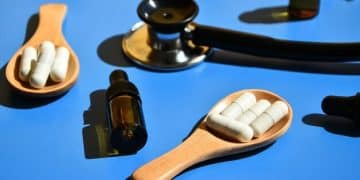Male Sexual Health After 50: What’s Normal & What to Watch For

Male sexual health after 50 involves understanding normal age-related changes like decreased libido and erectile function, while also recognizing potential issues like prostate problems and testosterone deficiency that warrant medical attention.
Understanding male sexual health after 50 is crucial for maintaining a fulfilling life. As men age, various changes can occur, and it’s essential to differentiate between what’s considered normal and what might require medical attention. Let’s explore this topic together.
Understanding the Landscape of Male Sexual Health After 50
Entering your 50s brings significant life changes, and sexual health is no exception. It’s a period where understanding your body and its evolving needs becomes increasingly important. Being informed allows you to distinguish between natural aging processes and potential health concerns that require professional attention.
Common Physiological Changes
Several physiological changes are considered normal as men age. These shifts can impact different aspects of sexual health.
- Decreased Testosterone Levels: Testosterone naturally declines with age, leading to reduced libido, energy, and muscle mass.
- Changes in Erectile Function: Achieving and maintaining an erection may require more stimulation and take longer.
- Prostate Enlargement: The prostate gland tends to enlarge, potentially leading to urinary issues that indirectly affect sexual function.
Psychological and Lifestyle Factors
Beyond physical changes, psychological and lifestyle factors also play a significant role in male sexual health after 50. These elements can either exacerbate or mitigate the impact of physiological changes.
- Stress and Anxiety: High stress levels can negatively impact sexual desire and performance.
- Relationship Dynamics: Intimacy and communication within a relationship can influence sexual satisfaction.
- Diet and Exercise: Poor diet and lack of exercise can contribute to issues like erectile dysfunction and reduced libido.
Understanding these factors allows men to take proactive steps to manage their sexual health, such as adopting a balanced diet, engaging in regular exercise, and addressing any underlying psychological issues.
Recognizing Normal Age-Related Sexual Changes
Distinguishing between typical age-related changes and signs of underlying health issues is crucial for maintaining good sexual health. While some changes are a natural part of aging, others may indicate a need for medical intervention.

Reduced Libido
A decrease in sexual desire is a common experience as men age. This is often linked to declining testosterone levels and can be compounded by stress, fatigue, or relationship issues.
- Causes: Lower testosterone, stress, medication side effects.
- Management: Lifestyle adjustments, hormone therapy (under medical supervision).
Erectile Changes
Changes in erectile function, such as needing more stimulation or experiencing less firm erections, are also normal. These changes can be concerning, but understanding the causes can help manage them effectively.
- Causes: Reduced blood flow, nerve damage, psychological factors.
- Management: Exercise, healthy diet, medications (if necessary).
Changes in Ejaculation
Some men may notice changes in their ejaculatory function, such as decreased force or volume. This is generally a benign change, but persistent issues should be evaluated by a healthcare provider.
Recognizing these normal changes can help men avoid unnecessary worry and focus on maintaining a healthy lifestyle to support their sexual health. Regular check-ups with a healthcare provider are essential for addressing any concerns and ruling out underlying medical conditions.
When to Seek Medical Advice
While many changes in sexual health are normal parts of aging, certain symptoms warrant medical attention. Recognizing these warning signs can help ensure timely diagnosis and treatment.
Persistent Erectile Dysfunction
Occasional difficulties with erections are common, but persistent or worsening erectile dysfunction (ED) can be a sign of an underlying medical condition. ED can be a marker for cardiovascular disease, diabetes, or hormonal imbalances.
- Symptoms: Inability to achieve or maintain an erection sufficient for satisfactory sexual intercourse.
- When to Seek Help: If ED occurs frequently and begins to impact your quality of life.
Painful or Difficult Ejaculation
Pain or discomfort during ejaculation is not normal and should be evaluated by a healthcare professional. This symptom could indicate a prostate infection, inflammation, or other urological issues.
- Symptoms: Pain, burning, or discomfort during or after ejaculation.
- When to Seek Help: Any occurrence of painful or difficult ejaculation should be promptly addressed.
Blood in Semen or Urine
The presence of blood in semen or urine is an alarming symptom that requires immediate medical attention. While it can sometimes be caused by minor issues, it may also indicate a more serious condition such as infection, injury, or cancer.
Recognizing these warning signs and seeking prompt medical advice can help ensure early diagnosis and treatment of any underlying health issues affecting male sexual health after 50.

Lifestyle Adjustments for Better Sexual Health
Making positive lifestyle adjustments is key to maintaining and improving sexual health. Simple changes in diet, exercise, and stress management can have a profound impact.
Diet and Nutrition
A balanced diet rich in fruits, vegetables, whole grains, and lean proteins is essential for overall health and can directly impact sexual function. Certain nutrients are particularly beneficial for sexual health.
- Foods to Include: Foods rich in antioxidants, such as berries and spinach, and foods high in zinc, like oysters and nuts.
- Foods to Avoid: Processed foods, excessive sugar, and high-fat diets can negatively impact blood flow and hormone levels.
Exercise and Physical Activity
Regular exercise helps improve circulation, reduce stress, and maintain a healthy weight, all of which are important for sexual health. Both aerobic and strength-training exercises can be beneficial.
- Benefits of Aerobic Exercise: Improves cardiovascular health and blood flow.
- Benefits of Strength Training: Increases testosterone levels and muscle mass.
Stress Management
Chronic stress can significantly impact sexual desire and performance. Practicing stress-reducing techniques can help improve overall well-being and sexual health. Consider mindfulness, yoga, or spending time in nature.
By incorporating these lifestyle adjustments into your daily routine, you can take proactive steps to support and enhance your male sexual health after 50.
Medical Treatments and Therapies
When lifestyle adjustments aren’t enough, various medical treatments and therapies are available to address specific sexual health issues. It’s important to consult with a healthcare provider to determine the most appropriate options.
Medications for Erectile Dysfunction
Several medications are available to treat erectile dysfunction. These drugs work by increasing blood flow to the penis, making it easier to achieve and maintain an erection. Common medications include sildenafil (Viagra), tadalafil (Cialis), and vardenafil (Levitra).
- How They Work: Enhance blood flow to the penis.
- Potential Side Effects: Headaches, flushing, nasal congestion, visual disturbances.
Testosterone Replacement Therapy
For men with low testosterone levels, testosterone replacement therapy (TRT) may be an option. TRT can help improve libido, energy levels, and muscle mass. It’s available in various forms, including injections, patches, gels, and oral medications.
- Potential Benefits: Increased libido, improved energy levels.
- Potential Risks: Prostate enlargement, sleep apnea, increased red blood cell count.
Other Therapies and Procedures
In addition to medications and hormone therapy, other therapies and procedures may be recommended depending on the specific sexual health issue. These could include vacuum erection devices, penile implants, or treatments for prostate enlargement.
Working with a healthcare provider to explore these medical treatments and therapies can help men find effective solutions for their individual sexual health needs.
Communicating with Your Partner and Healthcare Provider
Open communication with your partner and healthcare provider is essential for sexual health. Discussing concerns and seeking professional advice can lead to better outcomes and a more fulfilling sex life.
Talking to Your Partner
Honest communication with your partner about your sexual health concerns can strengthen your relationship. Sharing your feelings and needs can help reduce anxiety and improve intimacy. Be open about changes in your libido, erectile function, or any other related issues.
Seeking Professional Guidance
Regular check-ups with a healthcare provider are crucial for monitoring your overall health and addressing any specific sexual health concerns. Don’t hesitate to discuss any symptoms or changes you are experiencing. A healthcare provider can offer guidance, diagnose any underlying issues, and recommend appropriate treatments.
By fostering open communication and seeking professional guidance, men can take proactive steps to maintain and improve their male sexual health after 50.
| Key Point | Brief Description |
|---|---|
| 💪 Maintaining Muscle Mass | Regular exercise, including strength training, helps maintain muscle mass, which can decline with age, affecting overall strength and metabolism. |
| 🍎 Healthy Diet | A balanced diet rich in fruits, vegetables, lean proteins, and whole grains provides essential nutrients, supports heart health, and helps manage weight. |
| 🧘 Stress Management | Techniques like meditation, yoga, and deep breathing exercises can help reduce stress levels, improving mood, sleep quality, and overall well-being. |
| 🩺 Regular Check-ups | Routine visits to a healthcare provider are crucial for monitoring health indicators such as blood pressure, cholesterol levels, and screening for age-related diseases. |
Frequently Asked Questions
▼
Yes, it’s relatively normal. Testosterone levels naturally decline with age, influencing sexual desire. However, factors like stress, medications, and underlying health conditions can also play a role. Consult a doctor if you have concerns.
▼
Erectile dysfunction can result from various factors. These include reduced blood flow, nerve damage, hormonal imbalances, psychological issues like stress or anxiety, and underlying medical conditions such as diabetes or heart disease.
▼
Absolutely. A healthy diet rich in fruits, vegetables, and lean proteins, along with regular exercise, can significantly enhance sexual health. Stress management techniques and open communication with your partner are also beneficial.
▼
Yes, several medical treatments are available. These range from medications like Viagra or Cialis for erectile dysfunction to testosterone replacement therapy for low testosterone levels. Consulting a doctor is essential to determine the most appropriate treatment.
▼
Focus on lifestyle factors like maintaining a healthy weight, exercising regularly, and managing stress. Communicate openly with your partner, and don’t hesitate to seek professional medical advice if you encounter persistent issues.
Conclusion
Navigating male sexual health after 50 involves understanding and accepting natural changes, while also being proactive about addressing potential issues. By staying informed, making healthy lifestyle choices, and communicating openly with both your partner and healthcare provider, you can maintain a fulfilling and satisfying sex life well into your later years.





